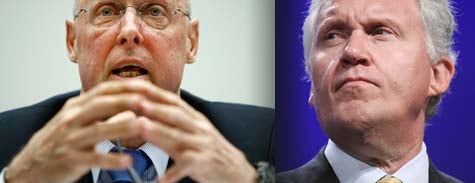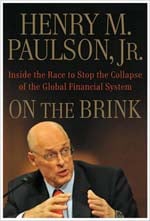
Update Jan. 21, 2011: Today, President Obama announced that he was appointing General Electric CEO Jeffrey Immelt to lead an advisory board focused on jobs. Last year, ProPublica’s Jeff Gerth reported on conflicting statements that Immelt made about GE’s financial health in private versus in public. Gerth followed up with a report about the Securities and Exchange Commission’s review of GE’s public statements.
This story was co-published with The Washington Post.
As the financial crisis worsened toward the end of 2008, CEO Jeffrey Immelt and other leaders at General Electric repeatedly assured the public that there was no need to worry about the company’s ability to access credit markets and refinance its massive debts as they came due.
But in private conversations that alarmed then-Treasury Secretary Henry Paulson, Immelt laid out a different picture of GE’s credit situation, according to Paulson’s new book about the crisis.
Instead, Paulson writes, Immelt on at least four occasions expressed worries about GE’s short-term debt, known as commercial paper, and eventually lobbied for access to special government guarantees for such debt.
To take one example: On Sept. 15, 2008, the day Lehman Brothers declared bankruptcy, Paulson says he was "startled" when Immelt came to his office and told him GE was finding it "very difficult" to sell short-term debt "for any term longer than overnight." A day earlier, GE sent investors a letter (PDF) saying its ability to sell commercial paper was "robust."
Immelt, in a statement issued Friday by GE, said he "does not believe" the two discussed problems with GE commercial paper on Sept. 15, or in one previous talk. The company did not contest Paulson's account of other conversations about the issue a few weeks later.
 If correct, the portrayals in Paulson’s book, "On the Brink: Inside the Race to Stop the Collapse of the Global Financial System," could spell trouble for GE in court, where shareholders are accusing Immelt and other company executives in civil suits of violating securities laws by misleading investors in the fall of 2008 about GE’s finances and withholding key information.
If correct, the portrayals in Paulson’s book, "On the Brink: Inside the Race to Stop the Collapse of the Global Financial System," could spell trouble for GE in court, where shareholders are accusing Immelt and other company executives in civil suits of violating securities laws by misleading investors in the fall of 2008 about GE’s finances and withholding key information.
Immelt and other defendants have denied the claims, filed in federal court in New York City, and are seeking dismissal. But a leading securities expert said Paulson’s book could complicate the litigation.
"Assuming that what is in the book is accurate," said Donald C. Langevoort, the Thomas Aquinas Reynolds Professor of Law at Georgetown University Law Center, "it offers new facts that any judge would have to take very seriously in considering whether to allow a suit alleging violations of the securities laws to go forward."
GE said in a statement that all the company’s disclosures were accurate and that to suggest otherwise is misleading.
"During the period in question, GE confirmed through its public statements the widely known fact that the CP [commercial paper] markets were under great stress. The company also disclosed that, despite this stress, it was able to meet its funding needs throughout the crisis," the statement said. "In these circumstances," GE told the government that "market intervention was important."
GE spokeswoman Anne Eisele said the company’s commercial paper volume during the period in question was "consistent with prior periods." She also disputed Langevoort’s opinion that the book could affect the litigation.
The discussions with Immelt, like others in the book, are based on Paulson’s call logs and his recollection of what transpired. There are no transcripts or documents to back up those conversations. Paulson’s spokeswoman said he was not available for an interview.
Paulson’s disclosures help flesh out one of the more perplexing mysteries of the 2008 bailout package: How, in a matter of a few weeks, GE’s highly profitable finance arm, GE Capital, became eligible for a federal debt guarantee program that initially excluded firms like GE.
In his book, Paulson takes credit for helping to persuade Sheila C. Bair, the chair of the Federal Deposit Insurance Corp., which runs the program, to change the rules and allow in financial institutions like GE. By last June, the FDIC was guaranteeing more than $70 billion in GE debt, much of it the short-term commercial paper companies use for operating expenses.
As investors fret, reassuring words
At the center of the shareholder lawsuits is GE’s sale of stock early that October. The company wound up raising $15 billion; $12 billion from investors who bought common stock and $3 billion from Warren Buffett, whose firm, Berkshire Hathaway, bought preferred stock.
Despite the successful sale, investors worried about GE. The company’s stock price, like that of many others, dropped. The price of insuring GE’s debt – as measured by credit default swap rates – soared much higher than for other triple-A rated companies. At the time, GE was the biggest U.S. issuer of commercial paper.
GE began reassuring investors with a Sept. 14 letter (PDF). Ten days later, the company’s chief financial officer told analysts the company was having "no issues" meeting its commercial paper funding needs. Immelt added that GE’s overall funding situation looked "very secure."
Yet according to the book, Immelt struck a different tone in conversations with Paulson. On Sept. 8, Paulson writes that Immelt phoned in late morning, "to tell me that his company was having problems selling commercial paper" and that the report "alarmed me." When Immelt delivered a similar message on Sept. 15, Paulson describes being "startled."
Immelt, according to GE, doesn’t believe he and Paulson discussed problems with the company’s commercial paper in those two calls. On the 15th, Lehman Brothers filed for bankruptcy, triggering large write-offs at one of the industry’s oldest money market funds. The funds are major purchasers of short-term corporate debt, including GE’s, and fears quickly rippled across the commercial paper market over the next day or two.
As part of its October stock sale, GE filed documents with the Securities and Exchange Commission, including one that quoted Immelt as saying: "We continue to successfully meet our commercial paper needs."
 Another filing contained a long litany of possible future risks, noting that "although GE Capital has continued to issue commercial paper, there can be no assurance that such markets will continue to be a reliable source of short-term financing for GE Capital."
Another filing contained a long litany of possible future risks, noting that "although GE Capital has continued to issue commercial paper, there can be no assurance that such markets will continue to be a reliable source of short-term financing for GE Capital."
On Oct. 10, after the successful stock sale, Immelt was on a conference call with investors. "Even with all this volatility," he said, "we have never had issues" refinancing debt in the commercial paper market. GE’s top financial officer made similar statements to the analysts.
Lobbying to get loan guarantees
Two days later, early on a Sunday morning, Paulson called Immelt. Because GE Capital wasn’t a traditional bank, GE wouldn’t be eligible for the FDIC’s soon-to-be announced program to guarantee short- and medium-term debt, Immelt told Paulson.
"I don’t think we can do anything for GE," Paulson recalled telling him. Immelt told him to do what was best for the country, which impressed Paulson.
The next day, when Paulson met with the heads of America’s largest banks and cajoled them into accepting federal cash infusions, Immelt called to say his company was now at a disadvantage because it was left out of the program. Immelt said GE officials were “nervous,” according to Paulson. He quotes the GE executive as saying: "I’m worried about my company and our ability to roll over paper in the face of this."
Over the next few days the FDIC explained to bankers that the debt guarantee program applied only to banking institutions. Faced with probable exclusion, Immelt came to Paulson’s office on Oct. 16 and, according to the book, complained again. "We are the ones out there making the loans that the banks aren’t," Immelt is quoted as saying, "and we need help."
Paulson writes that he knew Immelt "was right" and told him "we would explore it with his finance team and the FDIC." So, Paulson explains, he and one of his aides worked hard to get Bair "comfortable with making this decision."
The following week, the FDIC changed its rules, and by early November GE had been accepted into the program. Analysts said that the program was critical to GE’s financial health and that it enabled the company to avoid paying exorbitant prices to sell debt in late 2008.
Whatever advantages GE gained from the guarantee program were not enough to stave off short-term woes. By February 2009, the company was forced to cut its quarterly dividend by two-thirds. And the next month, Standard & Poor’s lowered its credit rating to AA+ – the first downgrade in decades.
Immelt and Paulson are longtime business associates. Goldman Sachs, which Paulson headed before coming to Treasury, has long been GE's investment banker. "I’ve known Jeff for years," Paulson writes, "and admired the cool, unflappable demeanor he had displayed as CEO of the biggest, most prestigious company in America."
Director of Research Lisa Schwartz contributed to this report.



